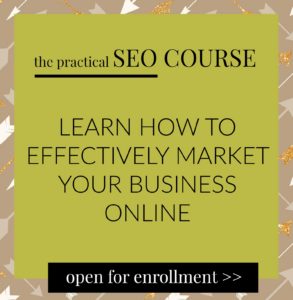SEO has changed so much over the last few years. When, in so many areas of running a small business, things are getting more complex with new rules added (please don’t even mention the new VAT rules on digital products!), it’s actually quite refreshing to find out that SEO has become more human and even mere mortals can now master it!
[bctt tweet=” SEO has become more human and even mere mortals can now master it!”]
Here are my favourite 10 things that still work in SEO in 2015 and how to apply it to your own business:
1. Keywords, Meta tags and H tags are not going anywhere!
These are still important, you still need to tell the search engines what your website is about. So, you still need to do your research and make sure you update your website when you introduce new products or services.
2. Make sure your website is mobile friendly.
This means having a responsive design, which adapts to the mobile or tablet display that your potential customers use. More and more people are now accessing internet on the go, shopping on-line whilst they are stuck on a train or bored at Sunday visits to their in laws. If your website doesn’t display well, they are more likely to click off and go to your competitor. This is not completely new for 2015, but what’s new is that Google is likely to ignore your website in searchers if it’s not mobile responsive. Check with your website provider if you are not sure whether your website is mobile ready.
3. Local is great!
If you are a local business (e.g. shop or services focusing on particular area) you have a greater chance to be top when it comes to searchers for your keywords. Make sure you are registered with Google Business and include your contact details (including your address) visibly on your website (footer is a good place). To improve your local ranking join local business directories and directories that are directly linked to your business niche.
4. Make your business visual!
People are more likely to buy from you if they see you demonstrating your product as well as just having it on your website as a product. Videos don’t always have to be professionally made, in fact your potential customers might enjoy the authenticity of homemade videos. If you have not got a YouTube channel, 2015 is a good year to start one.
5. Don’t forget to market your website off-site too!
Organic SEO can take a while to start working, especially if you are just starting. Your website traffic can also come from sending out your on-line newsletter, social media posts and networking with other businesses and potential customers.
6. Focus on quality, not quantity.
You heard it before, but yes, content is king! One well written blog post can bring more website traffic than several short blog posts that have no real value. Think about your potential customers, what would they find useful to read about? What do you think might be their current problems and how can you help solve it for them?
7. Your brand is your secret SEO weapon.
This is something that has been trickling to the surface for a while, but in 2015 it’s become even more important that you put your brand across. By brand, I mean your business name which is unique and matches your website domain.
8.Social Media links will become even more important.
Unlike Facebook, Twitter or Pinterest, Google+ failed to attract business owners and in mid 2014 Google even scrapped their Authorship scheme. If it makes sense for your business to be on Google + keep your account there, but the good news is that Google is now going to give other social media similar weight as to their own network.
9. Don’t get dragged into ‘black hat’ SEO.
Whilst in the past you could get away with applying ‘black hat’ techniques to your SEO (spam links, vast blog networks, keywords spamming or low content) now it will become more difficult and it can get you into hot water with Google. Which for us, small business owners, is actually good news, as we now have as much chance to succeed as any large company (that probably was using these techniques in the past!). Put your efforts into great content, clean layout and customer experience and show that you are a genuine business. And next time when you get an e-mail about buying website links, just delete it! Instead, build your links organically and only add and seek links that are in line with your business.
10. SEO should no longer be seen as a separate task or business department.
It needs to become part of your on-line (and off-line) marketing, content management and overall business running.
This is by no means an exhaustive list, but it’s a great place to start. I’d love to hear your suggestions in comments below and can’t wait to read how you are applying this into your own business.
Magdalena



